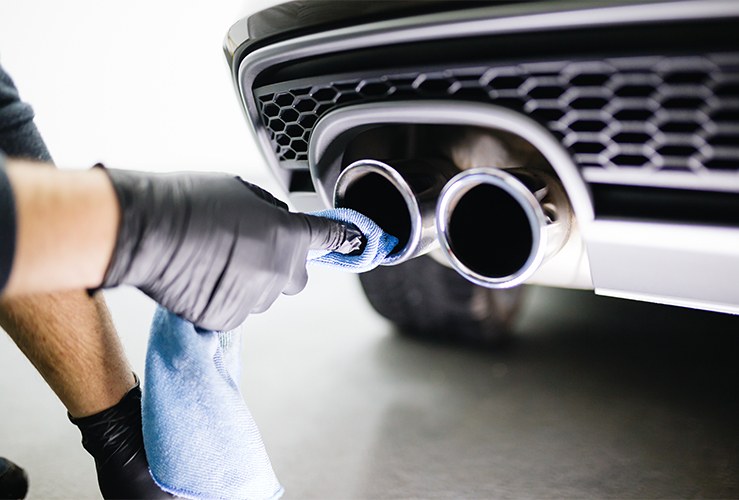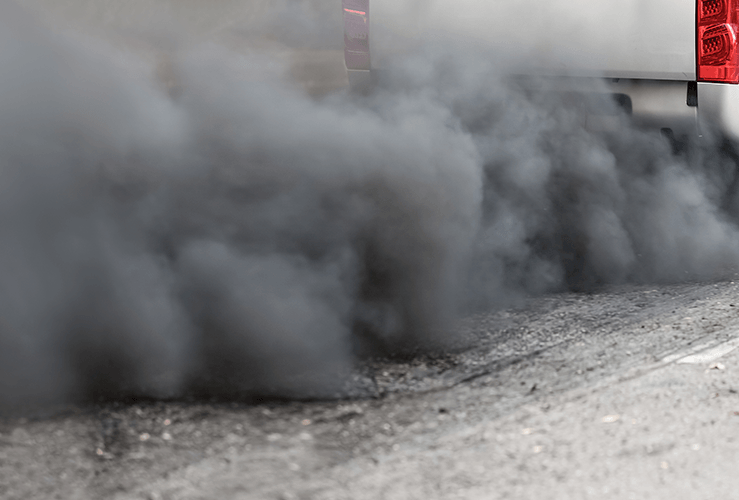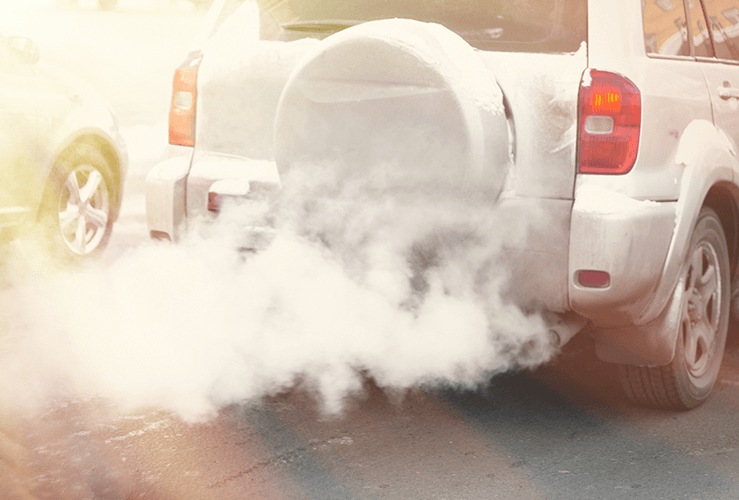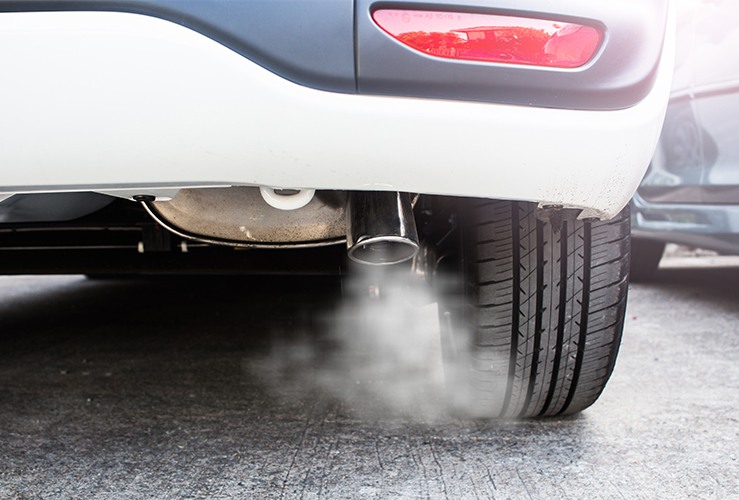Your exhaust system does several jobs in your vehicle including keeping your car quiet, helping your engine run properly, maintaining fuel efficiency, keeping fumes out of the cabin and reducing your emissions.
Ensuring your exhaust is in good condition
It is important for the sake of both the upkeep of your car and your own safety that you keep your car's exhaust in good condition, and know the symptoms of exhaust leaks.
To do this, you need to be able to notice when things are going wrong with your car's exhaust system (such as an unusual exhaust noise or exhaust blowing) and how to fix it.
What happens if you drive with a bad exhaust?
Drive with a bad exhaust and you may experience symptoms of exhaust damage such as strange noises, vibrations, decreased engine efficiency and/or smoke from the exhaust.
You shouldn’t drive your vehicle with a damaged exhaust system. Doing so is not safe and could have a negative effect on your pocket and your health.
Before we look in more detail at the exact issues a faulty exhaust system can cause let’s first establish, is it illegal to drive with a broken exhaust?
Driving a car with a broken exhaust can be dangerous and, although it is not technically stated in law that driving with a broken exhaust is illegal, the Road Traffic Act 1998 outlines that it is an offence to use a motor vehicle when it is such that the use of the motor vehicle or trailer involves a danger of injury to any person. For example, if your exhaust pipe is damaged and is at risk of falling off, this could pose a danger to other road users.
A broken exhaust could also lead to your car failing its MOT, especially if it causes high emissions or excessive car exhaust noise.
What effect can a faulty exhaust system have?
In addition to a decrease in vehicle performance, driving with a damaged exhaust system can also lead to decreased fuel efficiency and increased emissions, which can be harmful to you and the environment.
Vehicle breakdown cover
Having a suitable breakdown cover policy in place will give you peace of mind, should you experience any issues with your car, including exhaust problems.
Why not get a quote today?
For more details on the car breakdown cover options we offer visit our car breakdown cover page.

Exhaust Issues: Symptoms of exhaust issues to look out for
Check engine light
In some circumstances, as the exhaust system doesn’t have a warning light on its own, the check engine light will appear which could signify a problem with the exhaust pipes.

Black smoke from exhaust pipes
If black smoke is being produced by your exhaust pipe, this could indicate a faulty oxygen sensor, so excess fuel could be introduced into the air/gas mixture and your vehicle's engine will burn it off.
When too much fuel is being burnt, black smoke will be emitted from the exhaust.

White smoke (steam) from exhaust pipes
White smoke coming from the engine could indicate a serious cylinder head failure, in which exhaust gases escape directly into the engine compartment.
A similar situation can occur if coolant seeps into the combustion chamber and burns with the fuel.
Listen for any strange noises
Strange noises are signs of exhaust system failure. If you start to hear a deep or loud rumbling sound coming from your car then this is a sign that something is going wrong with your car's exhaust.
You should take your car to a technician and get this sorted as soon as possible.
It suggests that there could be exhaust problems such as an exhaust leak or a problem with parts such as the catalytic converter, which is necessary for reducing your car's impact on the environment and for keeping fumes, such as carbon monoxide, which can be harmful to you and your passengers, out of the cabin.
Strange noises from your car exhaust can also be a sign that there is a hole in the exhaust.
As well as being a safety element to getting this issue fixed, the longer you leave an exhaust issue, then the more damage is likely to be done and the more it will cost to fix.
Is it a roaring noise?
Roaring noises from your exhaust are also a sign of things going wrong and chances are the noise is a car sound silencer problem.
A silencer aids in dampening vehicle emissions and engine noise.
The silencer is the component of the exhaust system most likely to be corroded by acid as it is the part furthest from the engine, Therefore, it stays relatively cold, allowing gases to condense and form a pool of corrosive acid.so is likely to be the first bit of your exhaust system to go when roaring sounds are present.
Can you hear hissing noises?
Hissing noises are a sign of an exhaust leak. Such noises from your exhaust system suggest that there is a crack in the exhaust pipe, exhaust manifold or that there is a leaking gasket.
Chugging noises?
Chugging noises are also a sign of exhaust problems.
In this case it could be a blockage in the exhaust system.
Rattling noises?
A loose exhaust symptom, you may hear a rattling sound under your car if your exhaust has become misaligned.
Is a rattling exhaust dangerous?
If you experience loose exhaust pipe symptoms such as rattling, it is important to get the issue solved quickly. Leaving issues with your exhaust system could cause further damage to your vehicle, and exhaust issues also present a. possibility of pollutants generated from burning petrol entering the vehicle cabin.
A loud metallic vibration?
The sound of a loud metallic vibration or exhaust rattle can be a sign that there is something touching the exhaust pipe that shouldn't be.
Such sounds can also be loose exhaust symptoms, where a clamp, support bracket or mounting has got loose.
Exhaust noises related to the catalytic converter
If your catalytic converter is going wrong then you will hear an engine noise that sounds like a shaking box of rocks when your vehicle is stopped in traffic.
Catalytic converters are also popular with scrap metal thieves, particularly on larger vehicles such as SUVs.
If yours gets stolen then you will hear a loud exhaust noise on start up.
Find out some useful tips to help prevent your catalytic converter from being stolen.
Faulty exhaust: Locating the issue
Working out where the sounds are coming from on your car can help to pinpoint the exhaust issue.
Loud exhaust noise from front of car
Exhaust sounds coming from the engine area? This engine noise could mean you have a bad gasket or loose flexible pipe connection, or a more a serious issue such as a cracked exhaust manifold.
Exhaust noises from under the centre of the car
Noises underneath the vehicle near the centre section of the exhaust system could be related to a loose connection or a hole in your exhaust.
It could also mean you have an issue with your catalytic convertor, which would be more expensive to repair.
Exhaust noise at the rear of the vehicle
If your exhaust sound is at the back of the vehicle, this is likely to be related to the muffler (silencer) or a hole in an exhaust system pipe.
Changed performance
Another sign that your catalytic converter has gone is if you notice a difference in your vehicle's performance on start up.
If you find that your car is suffering a loss of power then this may be a sign that your exhaust is leaking.
If there is an exhaust leak, you may feel vibrations
You may notice unusual vibrations when you touch your steering wheel, foot pedals or car seat when you have an exhaust leak.
It could also be a sign of a hole in your exhaust or that the exhaust system is disconnected.
What's more, vibrations could be a sign of a problem with your engine and suggest that it is no longer running at optimum performance.

Lower fuel efficiency
Your fuel gauge - and how quickly it goes down - could be a good indicator of the condition that your exhaust is in.
Filling up more?
If you find that you need to fill up on petrol or diesel more often than usual then this could be a sign that there is a problem with your exhaust, or certainly some kind of issue with your car.
Exhaust leaks mean that your engine needs to work harder and this will then mean that you need to use more fuel.
Will I fail my MOT if my exhaust system is faulty?
If your exhaust is only partially damaged, your car may pass its MOT. You’ll likely be given an advisory notice that a fix is needed though, and you should ideally look to book your car in for the required exhaust repairs as soon as possible to avoid further damage and subsequent higher repair costs.
A vehicle which has a severely damaged or broken exhaust, such as a major leak or a part of the catalytic converter or diesel particulate filter missing will automatically fail
If you have exhaust problems, and your exhaust emissions are too high, this will result in an MOT failure. Your car can also fail if the exhaust produces too much noise.
Vehicle breakdown cover
Having a suitable breakdown cover policy in place as a car owner will give you peace of mind, should you experience any issues with your car, including exhaust problems.
Why not get a quote today?
Should your car suffer a mechanical failure Start Rescue have you covered with affordable and reliable breakdown cover.
Current breakdown cover not yet due to expire? Sign up below to save money!
If you currently have breakdown cover with another provider, why not sign up here to receive the latest deals and discounts from Start Rescue when your current policy is due to expire.




